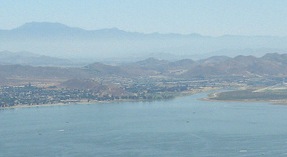San Jacinto River (California)
| San Jacinto River | |
| River | |
|
The mouth of the San Jacinto on Lake Elsinore, viewed from California State Route 74 (the Ortega Highway) on the southwest side of the lake
|
|
| Country | United States |
|---|---|
| State | California |
| Region | Riverside County |
| Part of | Santa Ana River basin |
| Tributaries | |
| - left | South Fork San Jacinto River |
| - right | North Fork San Jacinto River |
| Cities | Hemet, San Jacinto, Perris, Lake Elsinore |
| Source | San Jacinto Mountains |
| - location | San Bernardino National Forest, Riverside County |
| - elevation | 2,100 ft (640 m) |
| - coordinates | 33°43′52″N 116°48′36″W / 33.73111°N 116.81000°W |
| Mouth | Lake Elsinore |
| - location | Lake Elsinore, at the mouth of Railroad Canyon, northwest of the Sedco Hills and west of the Tuscany Hills of the Temescal Mountains., Riverside County |
| - elevation | 1,243 ft (379 m) |
| - coordinates | 33°38′45.06″N 117°18′53.42″W / 33.6458500°N 117.3148389°WCoordinates: 33°38′45.06″N 117°18′53.42″W / 33.6458500°N 117.3148389°W |
| Length | 42 mi (68 km), Northwest then southwest |
| Basin | 780 sq mi (2,020 km2) |
| Discharge | |
| - average | 16.4 cu ft/s (0 m3/s) |
| - max | 16,000 cu ft/s (453 m3/s) |
| - min | 0 cu ft/s (0 m3/s) |
|
Map of the Santa Ana River watershed with the San Jacinto subbasin highlighted in darker green.
|
|
The San Jacinto River is a 42-mile-long (68 km)river in Riverside County, California. The river's headwaters are in San Bernardino National Forest, but the lower portion of the 765-square-mile (1,980 km2) watershed is urban and agricultural land. As an endorheic watershed that is contiguous with other Great Basin watersheds, the western side of the San Jacinto Basin is a portion of the Great Basin Divide.
The river is formed at the west base of the San Jacinto Mountains by the confluence of its North and South forks. The South Fork flows from near Santa Rosa Summit, through Pine Meadow and Garner Valley to Lake Hemet, which holds 14,000 acre feet (17,000,000 m3) of water. Hemet Dam was built in 1895 to supply water to the city of Hemet. Downstream of the dam, the South Fork joins the North Fork east of the town of Valle Vista near Highway 74, and the main stem of the San Jacinto River continues northwest until it discharges into Mystic Lake, a couple of miles east of Lake Perris. Overflow from the river then flows southwest, passing under Ramona Expressway and Interstate 215, and through Railroad Canyon to Railroad Canyon Reservoir, also called Canyon Lake, which has a capacity of 11,900 acre feet (14,700,000 m3). Downstream of Railroad Canyon Dam, the river continues flowing roughly west southwest through the canyon through the Temescal Mountains for about 3 miles (4.8 km) until it drains into Lake Elsinore. The lake has very little outflow, but in years of heavy rainfall it has overflowed into Temescal Creek, a tributary of the Santa Ana River, that flows northwest to that river in Corona, California.
...
Wikipedia


